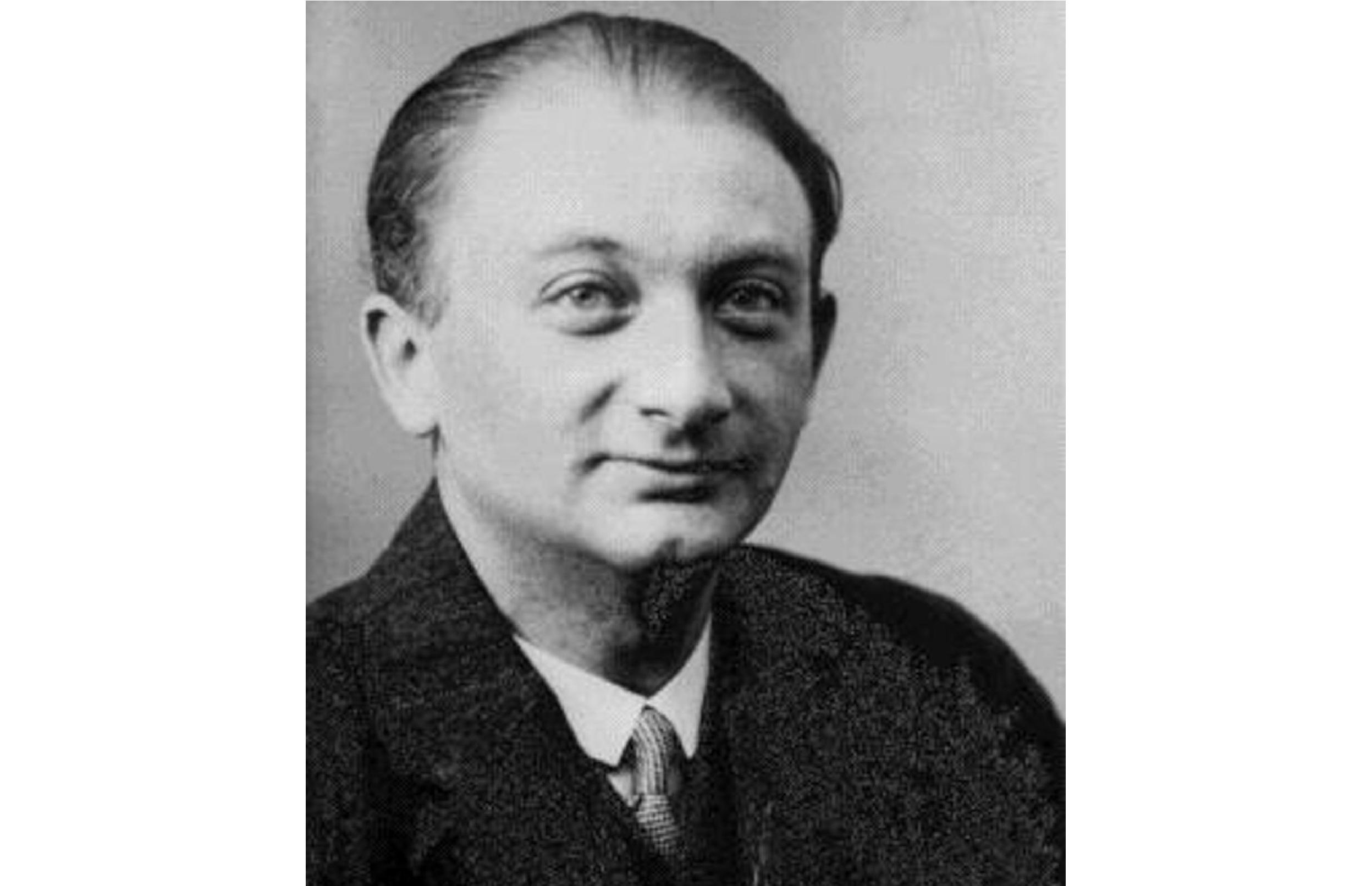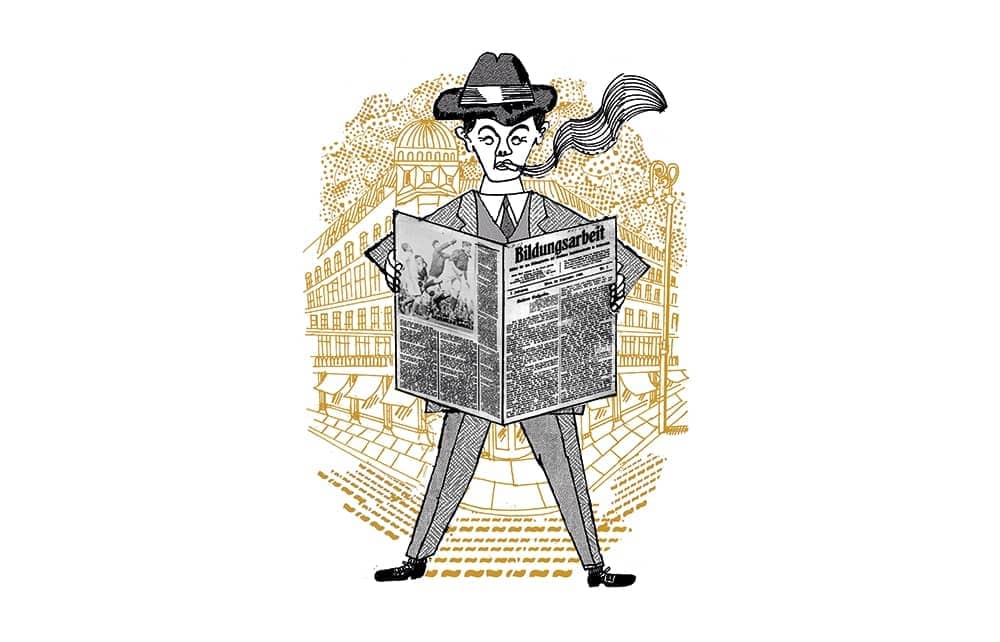As Russia’s assault on Ukraine continues, Volodymyr Zelensky’s ministry of education has just announced changes to the national curriculum that include removing almost all the Russian authors on the foreign literature syllabus. In last week’s Spectator, Svitlana Morenets revealed the new names: we see Robert Burns, whose inclusion may be a nod to Britain’s support during the conflict. Then there is Joseph Roth, a master of German prose, whose writing about interwar Europe speaks to Ukraine’s modern upheavals.
Roth was born in 1894 in Brody, a town that now stands in western Ukraine but then lay in what was known as Galicia, the eastern Austro–Hungarian crownland. He left as soon as he could and rarely returned, but wrote about it from afar with increasing nostalgia until he drank himself to death on the eve of the second world war.
Equally brilliant as a journalist and writer of fiction, Roth’s short and frantic career produced countless newspaper articles alongside 17 novels and novellas. Some of them are classics of Mitteleuropean literature, but too many were hastily knocked-out when a publisher threatened to reclaim the advance Roth had already spent on drink and the expensive hotels he preferred to live in. His fiction switched from a series of brisk, contemporary 1920s stories to a post-1930 collection of near-historical novels that chronicle a crumbling empire. As he wrote in his late novel The Emperor’s Tomb: ‘People call [it] the “World War”, and in my view rightly, and not for the usual reason, that the whole world was involved in it, but rather because as a result of it we lost a whole world, our world…’
In reading his greatest work, The Radetzky March, tenth-grade students in Ukraine’s schools will learn about a long-gone world whose decline is described over three generations of the Trotta family. Written in the early 1930s while Roth watched aghast as nationalism devoured Europe, this sad book has many joys, not least the delicate way he describes the sun setting on the multi-ethnic, polyglot empire whose collapse he mourned, in which Jews, Czechs, Slovenes, Ukrainians, Poles, Germans and others lived alongside each other.
A deeply conflicted man – by turns proud of and in revolt against his Jewish origins – Roth saw sooner than most what the fall of Austria-Hungary and rise of nationalism would mean for his fellow eastern Jews. ‘We are drifting towards great catastrophes,’ he wrote to a friend in 1933. ‘Apart from the private – our literary and financial existence is destroyed – it all leads to a new war. I won’t bet a penny on our lives. They have succeeded in establishing a reign of barbarity. Do not fool yourself. Hell reigns.’
He was painfully aware of what it was to have one’s liberty curtailed and identity reshaped by changing borders
Roth’s work describes conditions that Ukrainians have come to know well. Like many from that region, he grew up with Russia breathing behind him, a theme he plays with in his novels Flight Without End, Tarabas and Job. Roth understood the subtler forms of violence that war enacts upon the mind. Beyond witnessing death, injury, destruction and grief, he explores war’s insidious effects on characters who had been uprooted, severed from their homes and left stateless, forced to alter their identities as exiles and refugees, wary ever again to unpack their suitcases, the tension of living in the hands of politicians and generals. People like Roth, and like many Ukrainians today.

He learned what it was to inhabit this condition after serving in the first world war, when Austria-Hungary was carved up. His hometown became part of the new Polish Republic, and the culturally German-oriented Roth discovered he was now a Polish citizen. It took until 1921 for him to regain his Austrian citizenship – a battle he won with some dubiously acquired documents, which caught up with him seven years later when he again had to trawl through the anti-Semitic Viennese bureaucracy to prove himself the Austrian he knew himself to be.
He became painfully aware of what it was to have one’s liberty curtailed and identity reshaped by changing borders. Freedom to cross national lines was integral to his livelihood as a reporter for the Frankfurter Zeitung, as he made plain in a letter to a colleague in 1928: ‘Without a passport, I’m toast.’
Roth left Berlin on the day that Hitler took power, and he lived his remaining six years in Parisian exile, rootless and despairing. What, he asked in 1937 in a preface to a new edition of his famed essay ‘The Wandering Jews’, ‘is a man without papers? Rather less, let me tell you, than papers without a man!’ By that time, he, like innumerable other refugees, had been stripped of agency to a point whereby ‘life nowadays hangs from a passport as it once used to hang by the fabled thread. The scissors once wielded by the Fates have come into the possession of consulates, embassies and plainclothesmen’.
In his newspaper work, Roth traced Europe’s decline in the 1920s and 1930s, initially as a celebrated reporter whose boundless energy propelled him around the continent, filing luminous, wry, relentlessly perceptive dispatches for the Frankfurter Zeitung. Soon he was on the Nazis’ list of banned authors, The Radetzky March and other books having been burnt in Berlin. Articles written in exile such as ‘The Third Reich: Agency of Hell on Earth’ and ‘Europe is Possible Only Without the Third Reich’ are as fearless as their titles suggest. But he was just as damning of the far left as of the far right, having reported from the USSR too – a six-month exploration in 1926 disabused the former socialist of any remaining illusions about Marxism.
It proved pivotal in his conversion into a conservative monarchist who would devote his pained final years to a quixotic, doomed bid to reinstate the Habsburg monarchy, which he believed was the only force strong enough to resist the rise of Nazism.
The journey around Russia not only ended his infatuation with socialism, it also triggered the end of his marriage. While he roamed between Odessa, Moscow, Baku and the Caucasus mountains, Friedl Roth (née Reichler) remained alone and abandoned in Berlin, sinking into a state that would eventually see her permanently consigned to psychiatric care. It was at this point that Roth’s drinking developed from excessive to compulsive. He too began to fear he was going insane, as is clear from his correspondence with the novelist Stefan Zweig through the mid-1930s.
Friedl’s fate echoed that of Roth’s father. Nachum Roth went insane before Joseph was born. His father, his fatherland, his wife; these losses combined with a self-imposed loss of his original identity as an eastern Jew. Roth’s relationship to the patch of eastern Europe where he grew up was as complex and antagonistic as any element of his fractured psyche. He was torn between seeing the Ostjuden he left behind as admirably simple and contemptibly backward. In sophisticated Vienna and Berlin, the word ‘Galicia’ was synonymous with provincial squalor and illiteracy. Roth became an unsustainable mass of painful paradoxes, attempting to scrub away his embarrassing past and assimilate in the west, even adopting the Catholicism of the Austrian aristocracy he so admired. As he once observed of himself, he was ‘a Frenchman from the East, a Humanist, a rationalist with religion, a Catholic with a Jewish intelligence … What an oddity!’
Marooned in an existential borderland between the self he abandoned and the person he had tried to become, Roth became an increasingly inert alcoholic. He spent his final years of exile in Parisian cafés gulping brandy and channelling his formidable rage into broadsides against Nazism.
Three years ago, when the suggestion that Vladimir Putin might invade Ukraine was widely laughed off as Russophobic hyperbole, I explored Roth’s hometown to understand how it shaped his extraordinary life. Brody was once known for the vibrancy of its Jewish culture, but there are no Jews there now. The town, under Polish rule after the first world war, came under Russian occupation after the Hitler-Stalin pact. When the Wehrmacht moved in, the remaining Jews were either killed near the town or sent to concentration camps.
The house on Vulytsya Zolota (or Goldgasse, as the German-speaking Roth knew it) is no longer standing, but many nearby from his time remain. Roth’s secondary school, the former Royal Imperial Crown Prince Rudolf Gymnasium, where he dazzled his teachers with his poetic German prose and sharply analytical mind, is still there too. When I visited three years ago, the school chose two of its current star pupils, teenage girls named Nastia and Solomia, to answer my questions about its most famous alumnus. Did they want to read his books?
‘Yes, we do, because it’s our history. He’s maybe the most popular person from Brody from that time, a lot of tourists from Germany and Austria come here and are very interested in Joseph Roth. A lot of us are interested in him because when so many people come to us and ask about him, it’s not normal that we don’t know about that person!’ But are his books part of the curriculum here? ‘Unfortunately, no.’
More than a century on from Roth’s schooldays, he is reinstated as a canonical German language author. Ukraine is resisting Russian power, and pupils at his old school now have the opportunity to study his masterpiece. As ambivalent as Roth felt about calling this patch of eastern Europe his home, he would surely have raised a glass to that.
Keiron Pim’s Endless Flight: the Life of Joseph Roth is published on 6 October.






Comments